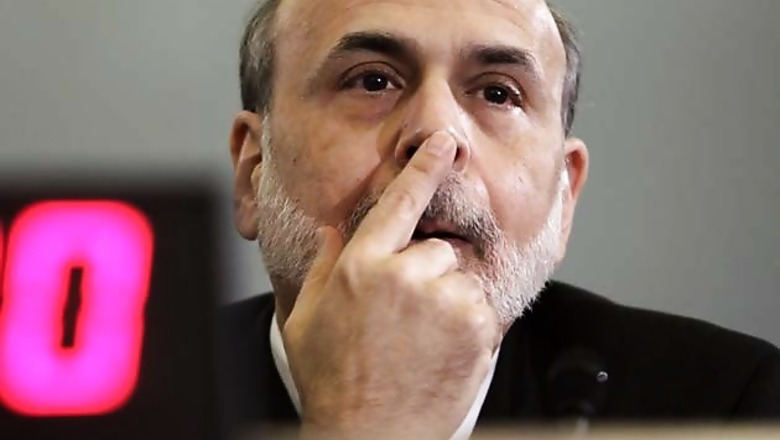
views
Washington: Federal Reserve Chairman Ben Bernanke on Tuesday offered a gloomy view of the economy's prospects, but provided few concrete clues on whether the US central bank was moving closer to a fresh round of monetary stimulus.
Bernanke told the Senate Banking Committee the economic recovery was being held back by anxiety over Europe's debt crisis and the path of US fiscal policy, and he expressed unease over a stagnant jobs market.
The Fed chairman told lawmakers the central bank was considering a range of tools it could employ to help the economy but he hewed closely to the message of watchful waiting that the central bank's policy panel delivered in June.
"Reflecting its concerns about the slow pace of progress in reducing unemployment and the downside risks to economic growth, the committee made clear at its June meeting that it is prepared to take further action," Bernanke said in his testimony on the Fed's semi-annual monetary policy report.
Some investors had hoped the Fed chief would signal that the central bank was moving close to a third round of bond purchases - or QE3 in market parlance - to support the economy.
Prices for US stocks initially fell on disappointment but clawed back to close up on the day on better-than-expected profit forecasts from Coca-Cola and Goldman Sachs. Prices for US government debt fell.
"The market was preparing for some signal of imminent policy action from the Fed and they certainly did not get that," said Omer Esiner, chief market analyst at Commonwealth Foreign Exchange.
Job slowdown can't be explained away
The Fed has held overnight borrowing costs near zero since December 2008 and has bought $2.3 trillion in government and mortgage-related debt to push long-term interest rates lower.
As the recovery faltered, it promised to hold rates at rock bottom levels until at least 2014 and, at its June meeting, it extended a program to lengthen the average maturity of bonds in its portfolio to depress long-term borrowing costs.
It next meets on July 31-August 1. Few economists expect it to take further steps to spur the recovery then, but many think fresh stimulus measures could come as early as the subsequent meeting in September.
"I think the issue is not if but when we'll have another round of quantitative easing," said Nouriel Roubini, chairman of Roubini Global Economics.
Despite the extensive support the Fed has lent the recovery, growth is too weak to cut unemployment. The economy expanded at a tepid 1.9 per cent annual rate in the first quarter, and economists think the second quarter will be even weaker.
With growth slowing around the globe, many central banks have eased policy recently, including the European Central Bank and the central banks of Britain and China.
At the hearing, lawmakers sought to lobby the Fed from both ends of the political spectrum. New York Democrat Chuck Schumer urged the Fed to ramp up its support for growth while Tennessee Republican Bob Corker advised it to stay on the sidelines.
Bernanke said the risks of a surge in inflation were low and that there was a modest risk of a broad-based decline in prices.
He said Fed policymakers would consider a range of tools to further stimulate growth if it became clear the labor market was not improving or if deflation risks mounted.
He cited the possibility of additional bond buying - whether Treasury debt or mortgage-backed securities - lending through the Fed's emergency loan window, and lowering the rate the Fed pays banks on reserves held at the central bank. The Fed could also use communications tools, such as extending its pledge to hold rates exceptionally low, Bernanke added.
He said recent deterioration in the labor market suggests the nation's 8.2 per cent jobless rate will come down all too gradually, saying for the first time the softness in hiring could not be explained away by purely seasonal factors.
During the second quarter, job creation averaged 75,000 per month, down from an average of 226,000 in the first quarter.
JPMorgan economist Michael Feroli said Bernanke's assessment of the economy was "slightly more downbeat" than that offered by minutes of the Fed's June meeting released last week.
Trouble at home and abroad
Bernanke told the committee that manipulation of the global benchmark interest rate Libor by banks and traders had undermined confidence in financial markets, and he called the process of calculating Libor "structurally flawed."
However, he said the Fed had limited authority to force changes since Libor was overseen by the British Bankers' Association.
Bernanke told lawmakers it was essential to find a way to avoid the "fiscal cliff" of sharp spending cuts and tax hikes that are scheduled to take place in the United States at the start of next year, warning it could tip the already weak economy into a recession.
He also said the Fed remains in close contact with European authorities, and is focused on making sure the US financial system remains resilient to financial shocks.
"Europe's financial markets and economy remain under significant stress, with spillover effects on financial and economic conditions in the rest of the world, including the United States," he said.


















Comments
0 comment